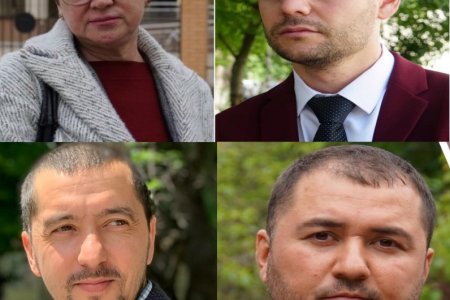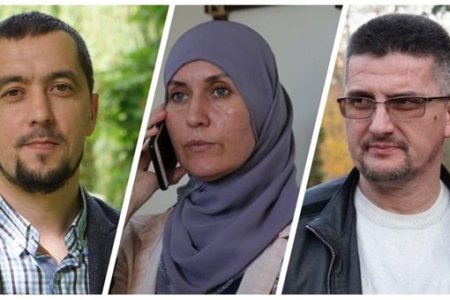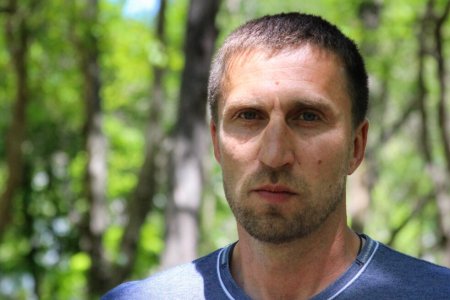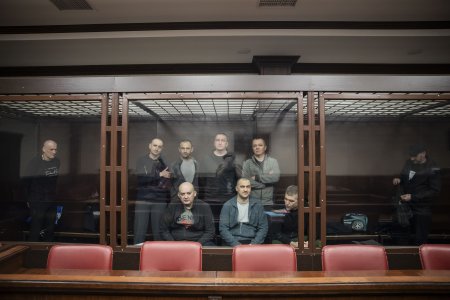
Russia has begun openly attacking lawyers in occupied Crimea, with three of the four Crimean Tatar lawyers detained on 26 and 27 May jailed for up to eight days. Such mass arrests on absurd charges are clearly a threat, aimed at deterring lawyers from defending Russia’s growing number of political prisoners. They coincide with new waves of repression as the Russian forces invading other parts of Ukraine abduct Crimean Tatars and other Ukrainians, holding them prisoner in Crimea.
In comparison with sentences of up to 20 years against Crimean Tatar journalists and human rights defenders, the eight-day terms of administrative arrest against Nazim Sheikhmambetov and Aider Azamatov, and five days against Emine Avamileva may seem minor. All three lawyers, however, were detained and have now been imprisoned for carrying out their professional duties, and that is a dangerous attack, not only on all lawyers, but on those victims of repression whom the lawyers represent.
Crimean Solidarity Coordinator Lutfiye Zudiyeva has spelled out the role that these lawyers, and their colleagues, play in the present circumstances. With most ‘court’ hearings in occupied Crimea taking place behind closed doors, and even journalists prevented from attending, lawyers play a huge role both in passing on information about the proceedings, and as a point of contact between the political prisoners and their families.
“Defence lawyers in Crimean conditions have turned from being ordinary lawyers into the press secretaries of those they defend and pass on the story of their persecution.”
“They have taken on this function consciously because there is nobody else who can inform families and the public. Thanks to their work, each prisoner is known and remembered. They have not turned into a grey, unrecognizable mass of political victims.”
It is, indeed, an honour, as Lutfiye says, to know such people. Their work and dedication have, however, made them a target for the Russian occupation regime. If earlier persecution, for example, of Emil Kurbedinov, made some pretence of pretexts unrelated to his work, that has now changed. Russia has now imprisoned three lawyers, including one woman, with all of them essentially detained for endeavouring to carry out their work.
As reported, Nazim Sheikhmambetov was detained on 26 May when he arrived at the Russian-controlled ‘court’ in Simferopol, along with several other lawyers, to represent their colleague Edem Semedlyaev. He had been arrested by the so-called ‘Centre for countering extremism’ and charged under Russia’s new legislation aimed at silencing reports about its war against Ukraine. Semedlyaev was fined 40 thousand roubles for somebody else’s anti-war Facebook post. He had been tagged by the real author, and had immediately removed the material, yet was still found ‘guilty’ of supposedly ‘discrediting the Russian armed forces’.
Sheikhmambetov was held for over 24 hours in custody. Then on 27 May, a number of colleagues, including Emine Avamileva and Aider Azamatov arrived to represent him in ‘court’, and were themselves detained. Avamileva was released for the evening, while Azamatov was also held in custody.
The two male lawyers were then sentenced to eight days’ imprisonment, Avamileva – to five days. The official pretext was a charge of having infringed sanitary norms under Article 20.2.2 § 1 of the same administrative code. This purportedly punishes for ‘organizing the mass, simultaneous presence and/or movement of citizens in public places, causing infringement of public order’. This was arrant nonsense, with each of the lawyers having arrived to carry out their professional duties and represent unwarrantedly detained colleagues.
All of this was doubtless clear to ‘judge’ Sergei Demenok from the occupation Central District Court who ordered the imprisonment of all three lawyers.
Invaluable service
It is equally clear to the FSB officers, prosecutors and ‘judges’ who take part in politically motivated persecution of Ukrainian citizens that they are taking part in imprisoning people who have committed no crime. They essentially all help each other in fabricating such cases, with the role in this of ‘judges’ having recently been condemned by the UN’s Secretary General in his report on the human rights situation in occupied Crimea.
Defence lawyers are powerless to prevent predetermined sentences in such political trials. They can, however, and do, highlight the lack of any evidence; the fabrication and use of torture in obtaining ‘confessions’.
Nazim Sheikhmambetov, for example, played a major role in defending Ukrainian political prisoner Oleh Prykhodko, and demonstrating how literally all ‘evidence’ had been fabricated.
Both Aider Azamatov and Emine Avamileva are involved in the ‘trial’ now underway of Crimean Tatar Mejlis leader, human rights defender and journalist Nariman Dzhelyal, civic journalist Asan Akhtemov and his cousin Aziz Akhtemov. While there was never any doubt that this entire ‘case’ was about reprisals against Dzhelyal, especially for his role in the Crimea Platform, these and other lawyers have ensured that the methods used, including torture, are publicly known.
All three lawyers also represent some of the over 80 political prisoners, most of them Crimean Tatar, arrested in Russia’s worst conveyor belt of repression, targeting civic activists and journalists.
See, for example, Russia passes 19-year sentences against Crimean Tatar journalist and activists for defending human rights



